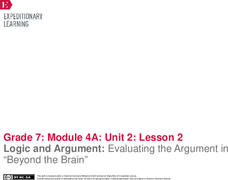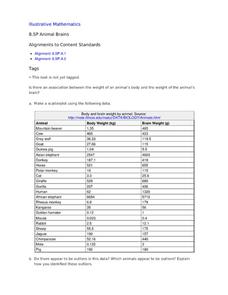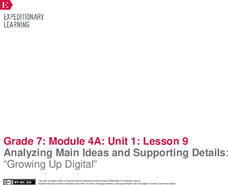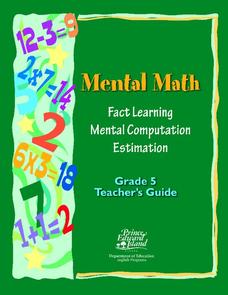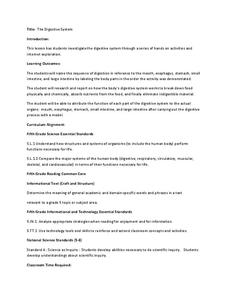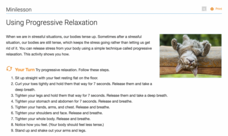American Museum of Natural History
Trip Up Your Brain
Sometimes different parts of the brain disagree. See what this disagreement looks like using a remote learning resource to experience how brains often take shortcuts. Pupils complete the activity, observe their results, and then read...
EngageNY
Logic and Argument: Evaluating the Argument in “Beyond the Brain”
The brain is not the mind. Scholars explore the claim by reading an informational article about neuroscience research, "Beyond the Brain." As they read, they answer text-dependent questions and complete an anchor chart to evaluate...
Curated OER
Animal Brains
Do big bodies make big brains? Let your learners decide whether there is an association between body weight and brain weight by putting the data from different animals into a scatterplot. They can remove any outliers and then make a line...
EngageNY
Analyzing Main Ideas and Supporting Details: “Growing Up Digital”
Young scholars continue their exploration of adolescent brain development by reading an informational text, "Growing Up Digital," by Matt Richtel. Then, with partners, they complete note-catcher worksheets to capture the article's main...
Curated OER
Musical Activities for Early Childhood Inclusion
Get your movers and shakers grooving to the beat with this series of musical activities designed to meet everyone's needs! Ten games, using an assortment of instruments, bring awareness to one's body, brain, and social interactions in a...
EngageNY
Evaluating an Argument: “Is Google Making Us Stupid?”
Does the Internet negatively affect peoples' brains? Scholars complete a Tracing an Argument note catcher to evaluate the question as they read the text "Is Google Making Us Stupid?" Exploring both sides of the issue, they add their...
Prince Edward Island
Fact Learning, Mental Computation, Estimation
Need help with mental math in your classroom? This guide is full of tips, tricks, and examples to help the teacher encourage learners to use their brain instead of a calculator. Practice problems are included with reasons how to use...
Curated OER
The Digestive System
Discover how the human body's digestive system works with a brain and stomach friendly activity. Scholars taste test a variety of foods to find out how they behave once in the mouth. Class members then play a game called Move That...
Core Knowledge Foundation
The Human Body—Systems and Senses Tell It Again!™ Read-Aloud Anthology
Nine lessons over three weeks explore the human body through read-alouds. Third graders listen to and discuss a reading followed by extension activities, including word work and comprehension practice. Learners draft a narrative essay.
EngageNY
Finding Relevant Information and Asking Research Questions: The Benefits of Video Games
Video games may not be so bad after all. As scholars read the text "The Many Benefits, for Kids, of Playing Video Games," they summarize the gist in their researchers' notebooks. Next, pupils draft supporting research questions based on...
Core Knowledge Foundation
First Grade Skills Unit 7
The last unit in the series by Core Knowledge focuses on alternative spellings, nouns, verbs, conjunctions, subject-verb agreement, using commas in a series, constructing sentences, and following the writing process while writing...
Core Knowledge Foundation
Third Grade Skills Unit 6: Gods, Giants, and Dwarves
The halfway mark of a series offers final skills practice in spelling patterns, suffixes, and building sentences with conjunctions in preparation for assessments that gauge proficiency. Remediation and enrichment follow the test results...
August House
Anansi Goes to Lunch - Pre-Kindergarten
In a multidisciplinary lesson plan, you will focus your instruction around the West African folktale, Anansi Goes to Lunch by Bobby and Sherry Norfolk while your little learners sing songs, play games, participate in a grand...
Curated OER
Author Study: Cynthia Rylant
Explore the life's work of one of the great children's authors using this ten-lesson author study unit. After first performing some whole-group research into the life of Cynthia Rylant, the class goes on to read six different stories,...
Nancy Fetzer's Literacy Connections
Expository Paragraph
Upper elementary and middle school writers learn how to craft an expository paragraph by following the six steps detailed in a 48-page instructional guide. Learners learn how to write six different types of informational paragraphs: to...
Houghton Mifflin Harcourt
Family and Friends: Extra Support Lessons (Theme 4)
Family and Friends is the theme of a unit offering extra support lessons. Follow each lesson plan's teach, blend, guided practice or practice/apply routine to reinforce concepts such as clusters, responding to reading, drawing...
Thoughtful Learning
Using Progressive Relaxation
Stress makes a mess of our minds and bodies. Like a vicious circle, stress causes our bodies to tense and makes it more difficult to get rid of the stress. Break the cycle for you and your students by practicing progressive relaxation....
Pearson Longman
Leap Year
Have you ever been asked to explain a leap year/leap day? Use this response to reading activity to support your scholars in finding out what it is, and its importance to our calendar. This resource is made up of eight questions following...
Curated OER
Who Would Win? Killer Whale vs. Great White Shark Storia Teaching Guide
Teacher guides are wonderful tools with tons of ideas that help you relate content in many different ways. Using the high-interest book, Who Would Win? Killer Whale vs. Great White Shark, learners hone their discussion and reading...
Education World
Every Day Edit - Arthur and His TV Friends
In this everyday editing worksheet, students correct grammatical mistakes in a short paragraph about Arthur the television show. The errors range from punctuation, capitalization, grammar, and spelling.
Byrne Bob
Dr. Moku's Hiragana Mnemonics
What do repulsive reptiles and a farting cow have to do with hiragana? Find out as you master the basics of hiragana quickly and easily. Each syllable is paired with an image and a sentence designed to stick in your mind. You won't be...
Curated OER
Filtering Angry Statements Activity
Help learners who struggle with blurting out statements when they are angry by reviewing a series of statements and determining when, if ever, they are appropriate to say.
Curated OER
Green Zone Common Ground Conversation Starter Worksheets
Finding common ground and building conversation can often prove a difficult task for many. Help learners build this important social skill using this resource, which includes a Venn diagram worksheet and sentence prompts to help students...
Steered Straight
Marijuana Awareness
February is Marijuana Awareness Month, and a set of interdisciplinary activities can make your class aware of the social, medical, legal, and psychological effects of marijuana. With writing prompts, research opportunities, and...
Other popular searches
- Brainstorming
- Brain Anatomy
- Brain Teasers
- Human Brain
- The Brain
- Brainstorm
- Brainstorming Questions
- Brainstorming for Writing
- Writing Brainstorming
- Brainstorming Topics
- Brainstorming Ideas
- Brainstorming Methods



